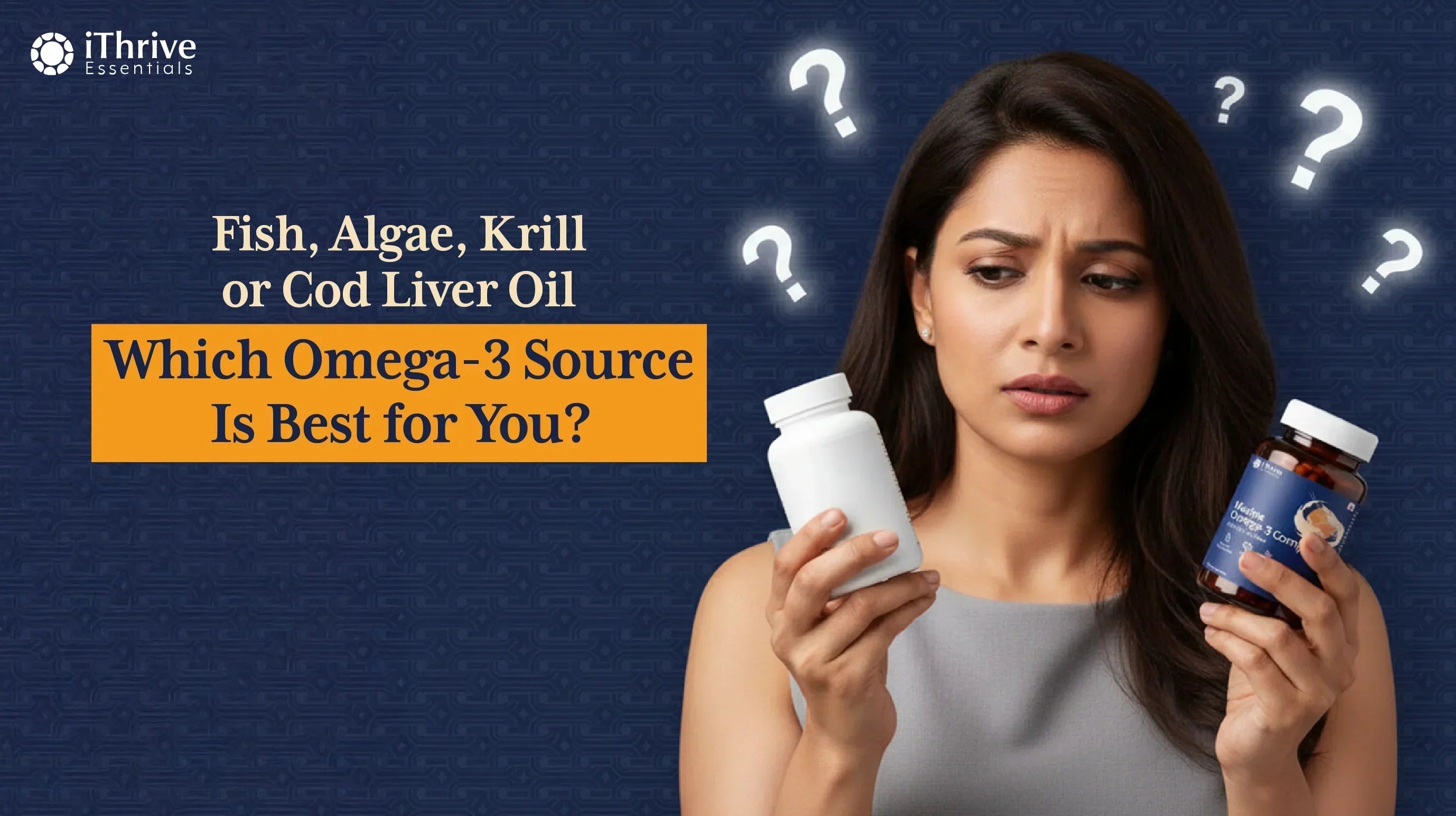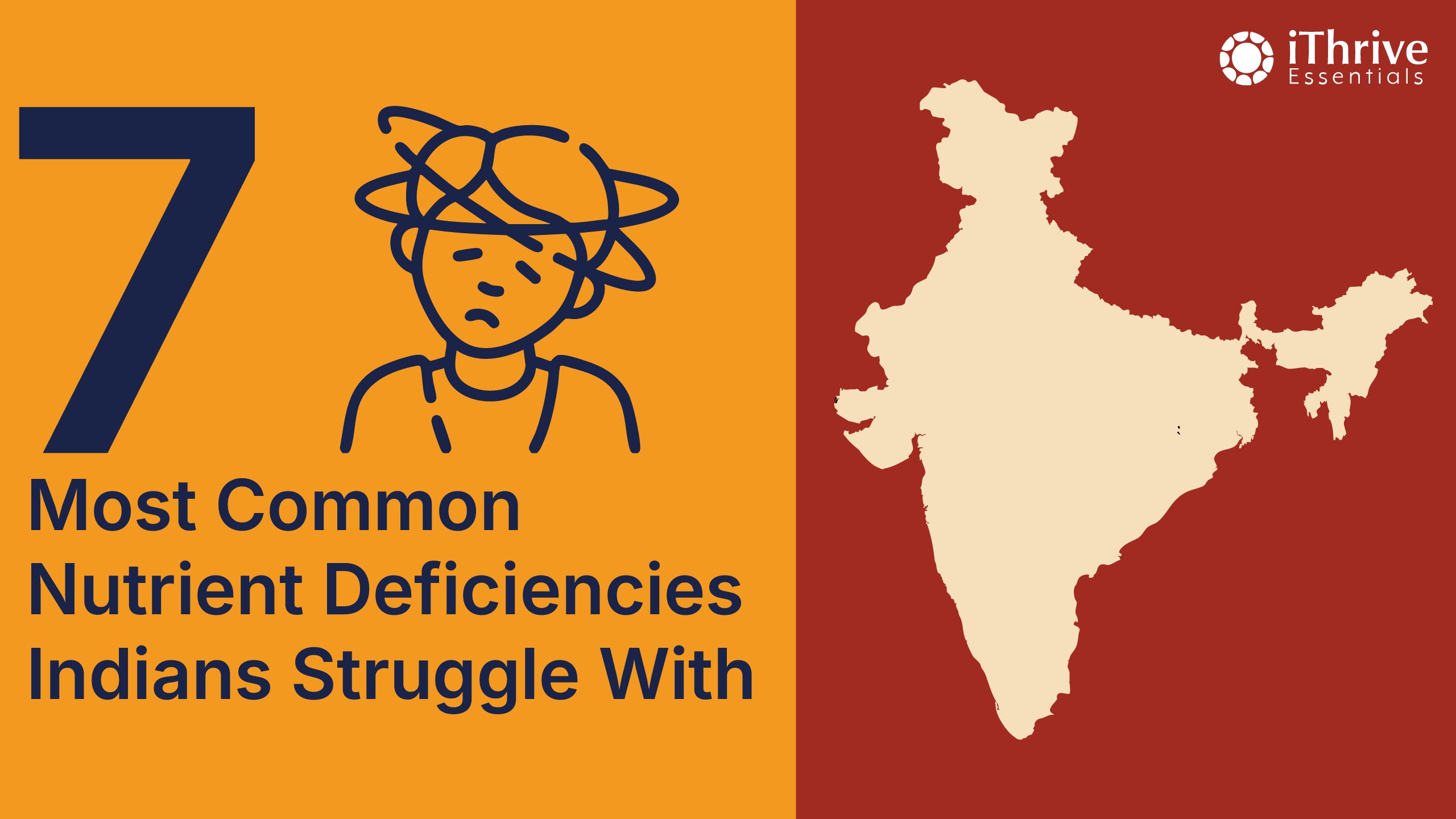
Fish, Algae, Krill or Cod Liver Oil: Which Omega-3 Source Is Best for You?
In recent years, omega-3 fatty acids have emerged as one of the most talked-about nutrients for overall health. From supporting heart and brain health to aiding joint comfort and immunity, their benefits are undeniable. And after the COVID-19 pandemic, more people than ever have started taking their health seriously. The focus has shifted from “just feeling okay” to actively understanding what goes into the body and how it impacts long-term wellness.
With this rise in awareness, however, comes confusion. There are so many sources of omega-3s like fish oil, krill oil, algae oil, and even blends of these, so it’s hard to know which one is truly effective. In the past, people often chose supplements based on advertisements, assuming that any product labeled “fish oil” or “krill oil” would provide the promised benefits. Many products highlighted heart, brain, or joint health support, but if you looked closer, the actual percentage of omega-3s in the capsules was often very low. Essentially, these claims were more marketing than reality.
Today, people are smarter and more discerning. They check formulations, ingredients, and actual omega-3 content before choosing a supplement. They want evidence-based results, not just labels. That’s why having accurate, clear information about omega-3 sources and their effectiveness is more important to make informed decisions and get the real health benefits your body needs.
Why Omega-3s Are Essential
Omega-3 fatty acids are often called essential fats and for a good reason. Your body cannot produce them on its own, which means you have to get them through food or supplements. But why are they so important? Let’s break it down.
-
Heart Health: Omega-3s, particularly EPA and DHA, help maintain healthy cholesterol levels and support normal blood pressure. They reduce inflammation in blood vessels, which can lower the risk of heart disease over time.
-
Brain and Cognitive Function: DHA, one of the key omega-3s, is a major building block of the brain. Adequate omega-3 intake supports memory, focus, and overall brain performance. It’s also linked to improved mood and reduced risk of cognitive decline with age.
-
Joint and Muscle Support: Omega-3s have natural anti-inflammatory properties, which can help reduce stiffness and discomfort in joints and muscles. This is particularly helpful for people with active lifestyles or those experiencing early signs of arthritis.
-
Eye Health: DHA is also a structural component of the retina. Sufficient omega-3 intake supports healthy vision and may reduce the risk of age-related eye issues.
-
Immunity and Inflammation: By regulating inflammatory processes in the body, omega-3s help the immune system function more effectively. They can also support recovery after stress, exercise, or illness.

Different Sources of Omega 3s
Fish Oil
When people think of omega-3 supplements, the first thing that comes to mind is usually fish oil. It’s the classic, well-researched option, and for good reason. Fish oil is extracted from fatty fish like salmon, mackerel, sardines, or anchovies and is a rich source of EPA and DHA, the two forms of omega-3s your body actually uses.
Why Fish Oil Is So Popular
-
High EPA and DHA Content: Fish oil provides a concentrated dose of the omega-3s most important for heart, brain, eye, and joint health. While plant-based sources like flaxseed provide ALA (a precursor to EPA/DHA), the conversion in the body is often inefficient. Fish oil gives your body the forms it can use directly.
-
Well-Researched Benefits:
-
Supporting cardiovascular health and maintaining healthy cholesterol levels
-
Improving cognitive function and focus
-
Reducing inflammation in joints and muscles
Downsides
-
Digestive Sensitivity: Some people experience fishy aftertaste or burps after taking fish oil. Choosing a high-quality or enteric-coated version can help minimize this.
-
Quality and Purity: Not all fish oils are the same. Some products highlight benefits like heart or brain support, but if you check closely, the actual amount of EPA and DHA may be very low. Choosing a fish oil from a trusted source ensures you’re actually getting the nutrients your body needs.
-
Lack of Antioxidants: Regular fish oil usually doesn’t contain antioxidants to protect the fatty acids from oxidation. This makes the oil more prone to becoming rancid, which can reduce its benefits and may cause digestive discomfort.
Krill Oil
When people explore omega-3 supplements beyond the usual fish oil, krill oil often comes up as a highly effective alternative. It’s extracted from tiny Antarctic crustaceans called krill and is rich in EPA and DHA, the forms of omega-3s your body can readily use. What makes krill oil stand out is its unique phospholipid structure and natural antioxidant content, which may offer additional benefits compared to standard fish oil.
Why Krill Oil Is So Popular
-
Phospholipid-Bound Omega-3s: Krill oil’s omega-3s are bound to phospholipids, which can improve absorption and utilization in the body. This means your body may get more out of the same dose compared to regular fish oil.
-
Natural Antioxidants: Krill oil naturally contains Astaxanthin, a potent antioxidant that protects cells from oxidative stress and supports overall health.
-
Well-Researched Benefits:
-
Supporting cardiovascular health and maintaining healthy cholesterol
-
Reducing inflammation in joints and muscles
-
Supporting brain health, focus, and cognitive functio
-
Providing antioxidant protection from Astaxanthin
Considerations
-
Digestive Comfort: Krill oil is generally gentler on the stomach than fish oil. Most people report minimal fishy aftertaste or burps, making it easy to take daily.
-
EPA/DHA Content: Krill oil usually has slightly lower EPA and DHA per serving compared to fish oil, so dosage and formulation matter. Some high-quality supplements combine krill + fish oil to maximize benefits.
Algae Oil
For those who don’t consume seafood or follow a vegetarian or vegan lifestyle, algae oil is an excellent option. Unlike fish or krill oil, algae oil is derived from marine algae but still provides the essential omega-3s your body needs, mainly DHA and some EPA.
Why Algae Oil Is So Popular
-
Vegan-Friendly Omega-3: Algae oil is completely plant-based, making it ideal for vegetarians, vegans, or anyone avoiding fish. It offers the same key benefits of omega-3s without relying on animal sources.
-
Supports Brain and Eye Health: DHA in algae oil is crucial for brain function, memory, and focus, as well as for eye health. It’s especially beneficial for people looking to maintain cognitive performance over time.
-
Sustainable and Eco-Friendly: Unlike fish and krill, algae oil is a more environmentally-friendly source of omega-3s, helping reduce overfishing and impact on marine ecosystems.
-
Well-Researched Benefits:
-
Supporting cognitive function and memory
-
Supporting eye and brain health
-
Providing anti-inflammatory benefits
-
Sustainable and plant-based source of DHA
Downsides
-
EPA & DHA Content: Algae oil generally contains less EPA than fish or krill oil, so some supplements may combine it with other omega-3 sources to balance the levels. Omega-3s from fish and krill oil are absorbed more efficiently than those from algae oil because they’re delivered in triglyceride (fish) or phospholipid (krill) forms - which the body processes more readily than the free‐fatty acid or ethyl ester forms common in many algae oils.
-
Cost: Algae oil is often more expensive than fish or krill oil due to the production process, but it is a reliable source for people avoiding animal products.
-
Lack of Antioxidants: Most algae oils do not naturally contain antioxidants to protect the fatty acids from oxidation. Without added antioxidant protection, the oil can degrade faster, reducing potency and freshness.
Cod Liver Oil
Cod liver oil is another well-known omega-3 source, but unlike regular fish oil, it is extracted specifically from the liver of cod fish. This gives it an extra nutritional edge, not just EPA and DHA, but also naturally occurring vitamins A and D. Because of this unique profile, cod liver oil has been used traditionally to support immunity, bone strength, and overall vitality.
Why Cod Liver Oil Is So Popular
Rich in EPA, DHA, and Vitamins A & D: Cod liver oil provides essential omega-3s while also delivering fat-soluble vitamins that support immunity, vision, skin health, and bone strength.
Supports Immunity and Bone Health: Cod liver oil plays a strong role in enhancing immune function, improving calcium absorption, and keeping bones strong especially beneficial during low-sunlight months.
Traditional and Well-Researched:
Cod liver oil has been used for decades to support:
-
Overall immunity and resilience
-
Bone and joint health
-
Skin and eye health
-
Heart and brain function
Downsides
Vitamin A Overload Risk: Because cod liver oil naturally contains high levels of vitamin A, taking it in large amounts or combining it with other vitamin-A-rich supplements can lead to excess intake. This can be a concern for pregnant women or those with liver conditions.
Digestive Sensitivity: Like fish oil, some people experience a fishy aftertaste, burps, or mild digestive discomfort. Choosing a high-quality or flavored version may help.
Lack of Antioxidants: Traditional cod liver oil also lacks antioxidants to protect the omega-3 fatty acids from oxidation. Without antioxidant support, the oil can become rancid more easily, reducing its effectiveness and causing unpleasant taste or digestive issues.
How to Choose the Best Omega-3 Supplement
By now, we’ve looked at the four main sources of omega-3s that are fish oil, krill oil, algae oil, and cod liver oil, and each has its own strengths. Fish oil is high in EPA and DHA and well-researched. Krill oil offers better absorption and natural antioxidants like Astaxanthin. Algae oil is plant-based and sustainable, making it ideal for vegans although not as powerful as animal based Omega 3 supplements.

But with so many options, how do you decide which supplement is truly effective? The answer is to look for products that combine the strengths of both fish and krill oil. Here’s why:
-
Higher EPA and DHA content: Fish oil provides a strong dose of the omega-3s your body needs for heart, brain, joint, and eye health.
-
Better absorption and antioxidant protection: Krill oil contains phospholipid-bound omega-3s, which are easier for the body to absorb, and antioxidants like Astaxanthin that protect cells from oxidative stress.
-
Balanced benefits: By combining both, you get the concentrated omega-3s from fish oil plus the enhanced absorption and antioxidant support from krill oil, giving you the best of both worlds. If you are not a vegan or vegetarian, then going for a supplement that combines both Krill & Fish oil is best for you.
One of the supplements that does this effectively is iThrive Essentials Marine Omega-3 Complex. It contains a blend of krill + fish oil, ensuring you get high-quality EPA and DHA, along with natural antioxidant support. It’s also formulated to be easy on the stomach, so you don’t have to worry about fishy aftertaste or burps.
When choosing an omega-3 supplement, always check:
-
EPA/DHA content per serving not just the total oil amount
-
Source quality: Antarctic krill and sustainably sourced fish oil are ideal
-
Added antioxidants like Astaxanthin and Vitamin E for cellular protection
Why Choose iThrive Essentials Marine Omega-3 Complex?
If you’re looking for a supplement that truly delivers the benefits of omega-3s, iThrive Essentials Marine Omega-3 Complex is designed to give you the best of both worlds that is fish oil and krill oil in one convenient soft gel.
Benefits of iThrive Essentials Marine Omega-3 Complex
-
Dual Oils for Maximum Benefit
This formula combines SuperbaBoost® krill oil with triple-strength Peruvian anchovy fish oil, providing a comprehensive spectrum of EPA and DHA. By including both sources, the supplement ensures you get a high-potency omega-3 formula that is easily absorbed by your body, supporting your heart, brain, joints, eyes, and overall cellular health.
-
Better Absorption with Phospholipids
The krill oil in this blend is phospholipid-bound, which means it is structurally similar to the fats found in our cell membranes. This allows your body to absorb the omega-3s up to two times better than standard fish oil. By delivering omega-3s in a form your body can efficiently use, the Marine Omega-3 soft gel helps maximize the health benefits for your heart, brain, joints, eyes, and cells.
-
Clinically Researched Ingredients
iThrive Essentials includes clinically studied ingredients such as SuperbaBoost® krill oil and AstaReal® astaxanthin. Research supports their role in cardiovascular health, brain function, anti-inflammatory support, and antioxidant protection, ensuring that you are getting a supplement with ingredients that are both effective and reliable.
-
Stable, Safe, and Effective
Omega-3 fatty acids are prone to oxidation, which can reduce their potency. This formula combines natural vitamin E and astaxanthin from krill oil to protect the omega-3s, keeping them stable, potent, and ready for your body to use.
-
Gentle on Digestion
Many fish oil supplements cause a fishy aftertaste or reflux. The combination of high-quality fish oil, krill oil & peppermint oil in this product makes it gentle on the stomach and easy to take daily, minimising any digestive discomfort.
-
Clean Formulation
All iThrive Essentials products are non-GMO, free from artificial fillers and additives meeting strict purity standards. This reflects iThrive’s commitment to science-backed, clean, and effective supplements that support your body, mind, and cellular health.




Leave a comment
This site is protected by hCaptcha and the hCaptcha Privacy Policy and Terms of Service apply.